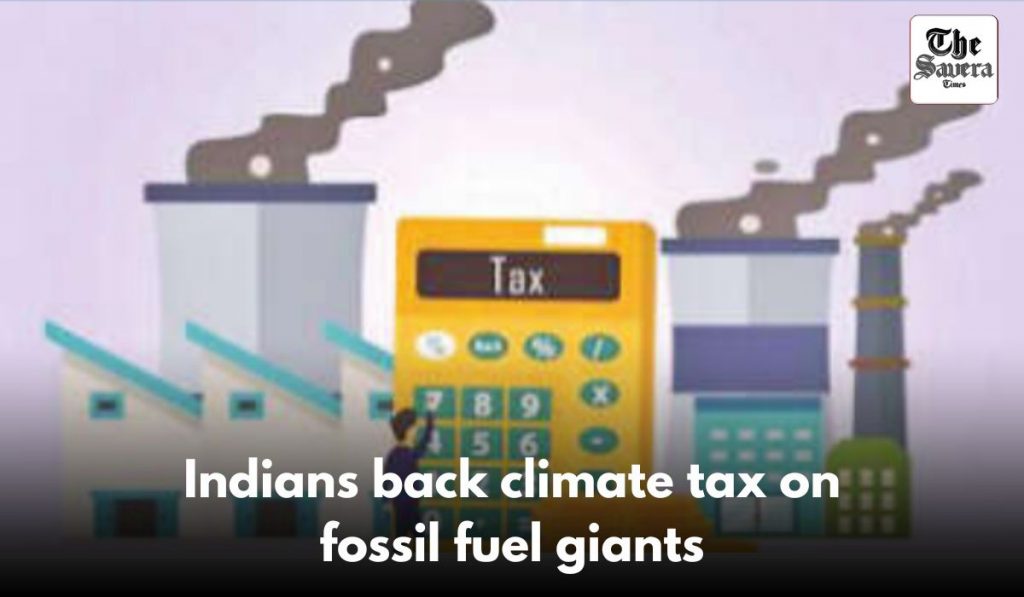A vast majority of Indians believe that oil, gas, and coal companies should be held financially accountable for the environmental damage they cause, according to a new global survey released during the Bonn Climate Conference 2025. The survey, commissioned by Greenpeace and Oxfam, found that 80 per cent of Indian respondents support taxing fossil fuel corporations to compensate for their role in triggering natural disasters like floods, droughts, wildfires, and associated health impacts.
When asked who should bear the burden of environmental taxation, 51 per cent of Indian responds pointed specifically to oil and gas corporations. Another 23 per cent believe the broader business community should be taxed, while 13 per cent support levying the cost on consumer goods, and 10 per cent feel even working people should contribute.
Only a marginal 2 per cent of those surveyed felt that fossil fuels should not be taxed at all. There was also a strong consensus about who should be held accountable within these corporations. Around 43 per cent believe that owners, shareholders, executives, and investors in fossil fuel companies should be primarily responsible for paying these taxes.
An additional 32 per cent felt consumers with high carbon footprints — such as SUV owners and frequent business-class fliers — should share the burden. Another 23 per cent supported taxation of all consumers. Public support for increasing fossil fuel taxes was striking. Forty-three per cent of Indians “strongly support” higher taxes on fossil fuels, while another 44 per cent “support” the move, particularly if the revenue is used to aid climate-vulnerable communities.
Only 13 per cent expressed opposition to such measures. The survey also highlighted strong backing for broader fiscal reforms. An overwhelming 85 per cent of respondents said they supported efforts to shut down tax loopholes used by wealthy individuals and multinational corporations. They also supported the idea of redirecting the increased revenue to fund social and environmental priorities.
On the political front, however, opinions were mixed. Asked whether the fossil fuel industry and the ultra-wealthy exert a harmful influence on Indian politics, 48 per cent of respondents said yes, while 52 per cent believed their influence was positive. Still, a strong 77 per cent of Indians said they would support a political candidate who pledged to tax the rich and hold polluting companies accountable.
The survey, conducted across 12 countries including Brazil, Canada, France, Germany, Italy, Kenya, Mexico, the Philippines, South Africa, Spain, the UK, and the US, showed a global trend in favor of taxing fossil fuel giants. On average, 81 per cent of global respondents supported such taxes, mirroring the Indian sentiment. There was also broad support for increased government spending to protect communities facing the brunt of climate change.
However, India diverged from the global pattern in some areas. In most surveyed nations, 68 per cent of respondents said super-rich individuals and fossil fuel corporations had a negative influence on politics. In contrast, Indian opinion was nearly evenly split on this issue. Similarly, while 64 per cent of global respondents felt their governments were not doing enough to curb corporate influence in politics, only 34 per cent of Indians held that view.
Among Indian political affiliations, 28 per cent of BJP supporters believed the government’s efforts were inadequate, compared to 44 per cent of Congress supporters. Commenting on the survey results, Greenpeace International Executive Director Mads Christensen said, “People are no longer buying the lies. They see the fingerprints of fossil fuel giants all over the storms, floods, droughts, and wildfires devastating their lives, and they want accountability.”
Oxfam International Executive Director Amitabh Behar added, “A new tax on polluting industries could provide immediate and significant support to climate-vulnerable countries and finally incentivise investment in renewables and a just transition.”
